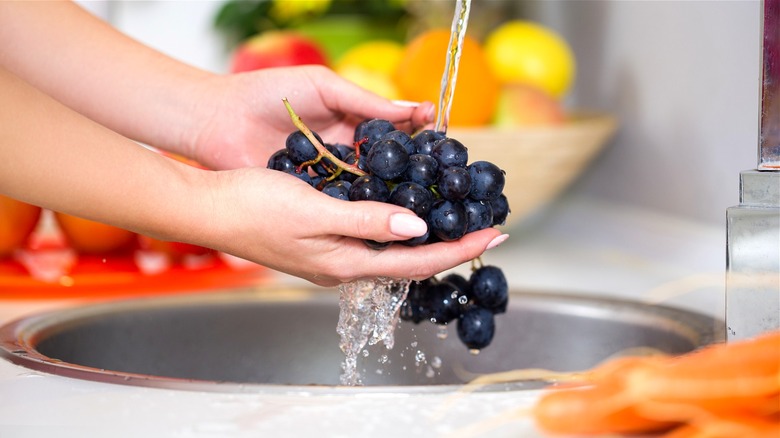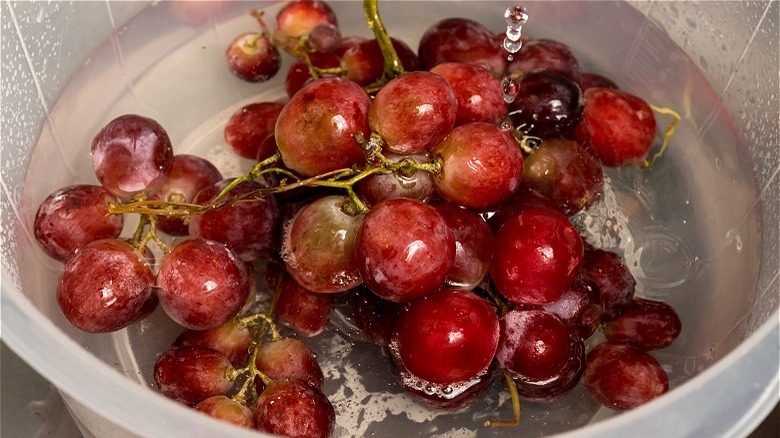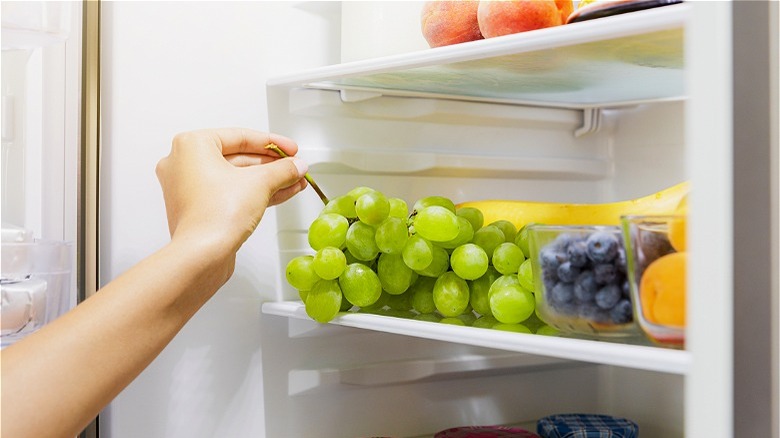We've Been Washing Grapes Wrong This Whole Time (They Need More Than A Rinse)
Not many of us enjoy eating dusty or dirt-covered tomatoes, strawberries, or grapes. One step customary for most meal preppers is pre-washing newly purchased fruits and vegetables each and every week. In fact, according to 2021 data collected by Gurney's Seed & Nursery Co., 86% of Americans wash their produce before chowing down.
While the CDC recommends washing your fruits and vegetables with water before consuming, you may want to take a different course of action if grapes are regularly on your list of favorite fruits. Even though grapes are good for your heart (and head), you may want to take extra precautions before eating a bunch or two.
You might not know that cleaning all your grapes at once isn't the best idea since leftover water sits on the ones you put back in the fridge and may encourage bacterial growth. Beyond being strategic when you wash those tiny green and purple orbs, what should you use to wash your grapes with in order to safeguard yourself and your family from potential pesticides?
Wash grapes in one of these convenient washing solutions
Unfortunately, even your homemade chocolate-covered grapes may be hiding unwanted pesticides, especially if you only rinsed the fruit a week ago. Washing grapes as you work your way through a newly purchased bag is important, but how you wash grapes proves to be equally significant. The good news is that the most effective cleaning agents for fruit are already somewhere in your home.
First off, baking soda is a wonderful cleaning agent when it comes to breaking down pesticide residue on fresh produce. In one 2017 study which focused on different solutions used to wash apples, a solution made with baking soda removed more pesticide residue from the surface of an apple's skin than either Clorox bleach or regular tap water. To wash grapes with baking soda, add one teaspoon each of salt and baking soda to a bowl of water. Add your rinsed grapes and gently swoosh around and rub the fruit for a minute before rinsing it again.
Alternatively, you can also add two tablespoons each of vinegar and baking soda to a bowl of water. Apart from massaging grapes in this solution, leave them to soak in the mixture for up to 15 minutes before giving them a final rinse. Now that you know how to properly wash conventional grapes to safeguard yourself from harmful pesticides, what are the warning signs that grapes have gone bad? Fortunately, learning how to store grapes properly can substantially increase their shelf life.
Keep grapes longer by giving them air
Make sure you're storing grapes properly so they last for more than a few days. While most of us already know that apples should always be kept in the fridge in order to extend their shelf life, the same goes for grapes as well. Grapes left on the counter will last only up to four days, but those stored properly in cold storage could last up to 10. Yet is there a specific way to store them so they stay nice and crisp?
Some people might think that grapes should be stored in airtight containers, yet in order for grapes to maintain their crunchy exterior, they need air to stay fresh. The best container for grapes happens to be the hole-filled bag you buy them in at the grocery store. Just make sure you're keeping a watchful eye on your fruit to make sure it's getting proper airflow, and wash the grapes when you're ready for a healthy snack.
If you've taken the necessary steps to keep your grapes fresh yet are still concerned about them rotting under your nose, be on the lookout for any signs of discoloration or changes in texture. Alternatively, you can take the time to wash your grapes in a homemade, convenient solution to wash off any pesticide-laden residue.


